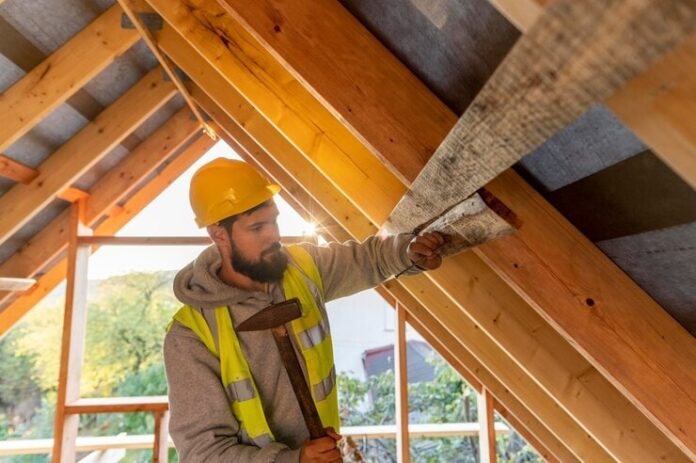Let’s be real – your roof is one of the most crucial parts of your home. It protects you and your loved ones from the harsh elements, keeps your energy bills in check, and plays a massive role in your home’s overall value. But here’s the kicker: a shoddy roof installation or repair job can leave you high and dry (literally!). That’s why choosing the right roofing contractor is an absolute must. Don’t worry, though – this guide has got your back!
In this comprehensive article, we’ll dive deep into the nitty-gritty of how to find the best roofing contractor for your needs. From reputation and experience to pricing and post-project support, we’ll cover all the bases to ensure you make an informed decision that safeguards your home (and your wallet!).
Key Takeaways:
- Hiring the wrong roofing contractor can lead to costly repairs, safety hazards, and a world of headaches.
- Thorough research, due diligence, and understanding key factors are crucial for finding a reliable and skilled roofing pro.
- Factors like reputation, workmanship, pricing, communication, and post-project support should be carefully evaluated.
- Taking the time to vet potential contractors can save you money, stress, and ensure a high-quality, long-lasting roofing solution.
Reputation and Experience: The Foundation of a Great Contractor
When it comes to something as important as your roof, you can’t afford to take chances. That’s why the reputation and experience of a roofing contractor should be at the top of your priority list. Here’s the lowdown:
- Online Presence: In today’s digital age, a quick Google search can reveal a wealth of information about a contractor’s reputation. Check out online reviews, ratings, and testimonials from previous customers. Pay close attention to recurring themes, both positive and negative.
- Years in the Biz: Experience matters, folks! A contractor with years (or even decades) of experience under their belt is likely to have encountered and overcome various roofing challenges. Inquire about their years in the industry and any specialized training or certifications they may have.
- Licenses and Insurance: Let’s be real – you don’t want to end up liable for any accidents or damages that occur during the roofing project. Make sure your contractor is properly licensed, bonded, and insured. This not only protects you but also demonstrates their professionalism and commitment to following industry regulations.
Pro Tip: Don’t hesitate to ask for references from previous clients. A reputable contractor should have no problem providing you with a list of satisfied customers who can vouch for their workmanship and professionalism.
Workmanship and Materials: The Backbone of a Solid Roof
Choosing the right roofing contractor isn’t just about their reputation – it’s also about their workmanship and the materials they use. After all, you want a roof that’s built to last, right? Here’s what you need to know:
- Material Knowledge: A good roofing contractor should be well-versed in the various roofing materials available, their pros and cons, and which options are best suited for your specific needs. Don’t be afraid to ask them to explain the differences between materials like asphalt shingles, metal, tile, and more.
- Installation Methods: Just like materials, there are different installation methods that contractors may use. A reliable contractor should be up-to-date on industry best practices and willing to explain their approach to you in detail.
- Quality Materials: Let’s be honest – you don’t want your contractor cutting corners by using subpar materials. Inquire about the brands and quality of materials they use, as well as any warranties or guarantees that come with them.
- Workmanship Guarantees: A confident contractor should stand behind their work. Ask about any workmanship guarantees they offer and what they cover (e.g., leaks, structural issues, etc.). A solid guarantee can give you peace of mind for years to come.
| Material | Pros | Cons |
|---|---|---|
| Asphalt Shingles | Affordable, versatile, easy installation | Shorter lifespan, vulnerable to extreme weather |
| Metal Roofing | Durable, energy-efficient, long-lasting | Higher upfront cost, can be noisy during rain |
| Clay or Concrete Tile | Attractive, low maintenance, fire-resistant | Heavyweight, more expensive, requires specialized installation |
Remember, the cheapest option isn’t always the best in the long run. A quality roofing contractor will help you balance cost and durability to find the perfect solution for your home and budget.
Estimates, Contracts, and the Paper Trail
Let’s talk paperwork. While it might not be the most exciting part of the process, getting everything in writing is crucial. Trust us; you don’t want any surprises or misunderstandings down the line.
- Detailed Estimates: Ask for detailed written estimates from multiple contractors. These should outline the scope of work, materials to be used, labor costs, and a projected timeline for completion. Don’t settle for vague estimates – you deserve transparency!
- Contract Review: Once you’ve selected a contractor, carefully review the contract they provide. Pay close attention to the payment schedule, warranty details, and any clauses or fine print that might raise red flags. Reputable contractors won’t have an issue explaining everything to you in plain English.
- Payment Terms: Speaking of payment, be wary of contractors who demand full payment upfront. A typical payment schedule involves a down payment, progress payments, and a final payment upon completion and your satisfaction with the work.
Pro Tip: Never feel rushed or pressured into signing a contract. A trustworthy contractor will understand the importance of giving you ample time to review all the details thoroughly.
Communication and Professionalism: The Hallmarks of a Great Contractor
Let’s be real – a roofing project can be a major undertaking, and you want to work with someone who communicates effectively and exudes professionalism. Here’s what to look for:
- Responsiveness: From the initial consultation to the final cleanup, a good roofing contractor should be responsive to your questions and concerns. Pay attention to how quickly they return your calls or emails and how thoroughly they address your queries.
- Clarity and Explanations: Roofing terminology can be confusing for the average homeowner. A skilled contractor should be able to explain the process, materials, and any technical aspects in a way that’s easy to understand.
- Project Management: Inquire about the contractor’s approach to managing the project, including their crew’s professionalism, job site cleanliness, and adherence to safety protocols. A well-organized contractor will ensure the job runs smoothly from start to finish.
- Listening Skills: While expertise is essential, a great contractor should also be an attentive listener. They should take the time to understand your specific needs, preferences, and any concerns you may have throughout the process.
Remember, you’ll be working closely with this contractor for an extended period, so choosing someone you can communicate with effectively is crucial.
Local Know-How and Code Compliance
When it comes to roofing, one size doesn’t fit all. Local climate conditions, building codes, and regulations can vary widely, so it’s essential to work with a contractor who knows the lay of the land.
- Local Expertise: Look for contractors who have extensive experience working in your area. They’ll be familiar with the specific challenges posed by your region’s weather patterns, such as heavy snowfall, high winds, or intense heat.
- Code Compliance: Building codes and permit requirements can be complex, and a reputable contractor should be well-versed in them. Make sure they understand the necessary inspections and approvals required for your project to avoid any legal or safety issues down the line.
- Community Involvement: A contractor with deep roots in the local community is often a good sign. They may be members of local trade associations or involved in community organizations, indicating their commitment to the area and their reputation.
Pro Tip: Don’t hesitate to ask potential contractors about their experience working in your specific neighborhood or with homes similar to yours. Their familiarity with local conditions can make a big difference in the quality and longevity of your new roof.
References and Portfolio: Seeing is Believing
While online reviews and testimonials can be helpful, there’s nothing quite like seeing a contractor’s work firsthand. That’s why it’s crucial to request references and review their portfolio of completed projects.
- References: Ask for a list of references from recent clients, preferably those with projects similar in scope to yours. Don’t just take their word for it – follow up and speak with these references directly. Ask about their overall experience, the quality of the work, and whether they’d hire the contractor again.
- Portfolio Review: A picture is worth a thousand words, and a contractor’s portfolio can speak volumes about their workmanship and attention to detail. Review their collection of completed projects, paying close attention to the quality of the roofing work, the cleanliness of the job sites, and any unique or challenging projects they’ve tackled.
As you review their portfolio, don’t be afraid to ask questions about specific projects. A knowledgeable contractor should be able to provide insights into the materials used, any challenges they faced, and how they overcame them.
Seeing a contractor’s work firsthand and hearing directly from satisfied clients can give you a level of confidence that online reviews alone can’t match. It’s a crucial step in ensuring you’re making an informed decision.
Safety First: Prioritizing Protection
Let’s face it – roofing can be a dangerous job. That’s why it’s essential to work with a contractor who prioritizes safety for their crew and your family. Here’s what to look for:
- OSHA Compliance: Reputable contractors should follow all Occupational Safety and Health Administration (OSHA) guidelines and industry best practices for safety. Don’t be afraid to ask about their specific safety protocols and training procedures.
- Liability Insurance: Accidents can happen, even with the best safety measures in place. Make sure your contractor carries adequate liability insurance to cover any injuries or damages that may occur during the project.
- Site Safety: When the crew arrives, take note of their safety practices on the job site. Are they using proper fall protection equipment? Do they have a plan for managing debris and keeping the area clean and hazard-free?
- Open Communication: A safety-conscious contractor should be willing to address any concerns you may have about potential hazards or risks associated with the project. They should work with you to develop a plan that ensures the safety of everyone involved.
Don’t be afraid to ask tough questions about safety. A reputable contractor will understand the importance of prioritizing protection and will be happy to put your mind at ease.
Post-Project Support: Beyond the Final Nail
The job isn’t done just because the last shingle is in place. A reliable roofing contractor should offer comprehensive post-project support to ensure your satisfaction and address any issues that may arise down the line.
- Warranty Coverage: Understand the details of the contractor’s warranty coverage, including the length of the warranty, what it covers (materials, workmanship, or both), and any exclusions or limitations.
- Service and Repair Process: Inquire about the contractor’s process for handling any necessary repairs or issues that may pop up after the project is complete. A reputable company should have a clear and straightforward procedure for addressing concerns and scheduling follow-up work.
- Customer Satisfaction: A contractor who truly stands behind their work will prioritize customer satisfaction. Look for companies that actively solicit feedback and are willing to go the extra mile to ensure you’re completely happy with the final result.
Remember, your roof is a long-term investment, and you want to work with a contractor who will be there for you even after the final nail is in place. Don’t hesitate to ask about their post-project support policies and commitment to customer service.
Pricing and Payment: Finding the Sweet Spot
Let’s be real – budget is always a factor when it comes to any home improvement project. While you don’t want to break the bank, it’s also important to avoid the temptation of going with the lowest bid. Here’s how to strike the right balance:
- Multiple Estimates: Get detailed estimates from at least three different contractors. This will give you a better understanding of the market rate for your project and help you identify any outliers (both high and low).
- Cost Breakdown: A reputable contractor should be able to provide a clear breakdown of the costs, including materials, labor, overhead, and any additional fees or charges. This transparency will help you understand what you’re paying for and ensure there are no hidden surprises.
- Value vs. Cost: While cost is important, it shouldn’t be the only factor in your decision. Consider the overall value a contractor offers, including their reputation, workmanship, warranties, and post-project support.
- Payment Terms: As mentioned earlier, be wary of contractors who demand full payment upfront. A typical payment schedule involves a down payment (often around 10-20%), progress payments tied to specific milestones, and a final payment upon completion and your satisfaction with the work.
Remember, the cheapest option isn’t always the best in the long run. A quality roofing contractor will work with you to find a solution that fits your budget while delivering a high-quality, long-lasting result.
The Bottom Line: Making an Informed Decision
Choosing the right roofing contractor is a big decision – one that can have a significant impact on the longevity, safety, and value of your home. By following the comprehensive guide we’ve laid out, you’ll be well-equipped to navigate the process with confidence.
From evaluating reputation and workmanship to understanding pricing and post-project support, we’ve covered all the bases to help you make an informed choice. Remember, this isn’t a decision to be rushed. Take your time, ask questions, and trust your instincts.
At the end of the day, a little extra effort upfront can save you from a world of headaches and costly repairs down the line. So, don’t settle for anything less than the best when it comes to protecting one of your most valuable investments – your home.
We hope this article has provided you with the insights and tools you need to find a roofing contractor you can trust. Happy hunting, and here’s to a roof that keeps you safe, dry, and worry-free for years to come!










